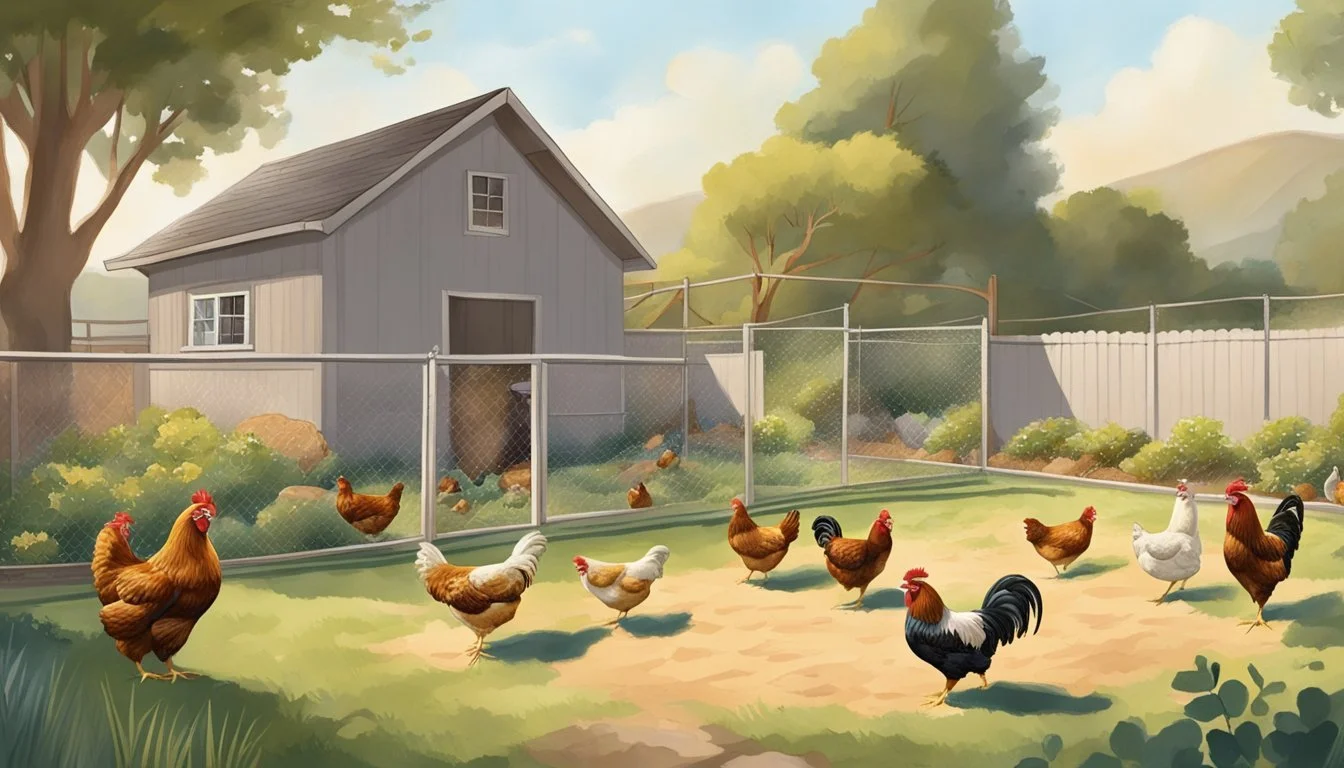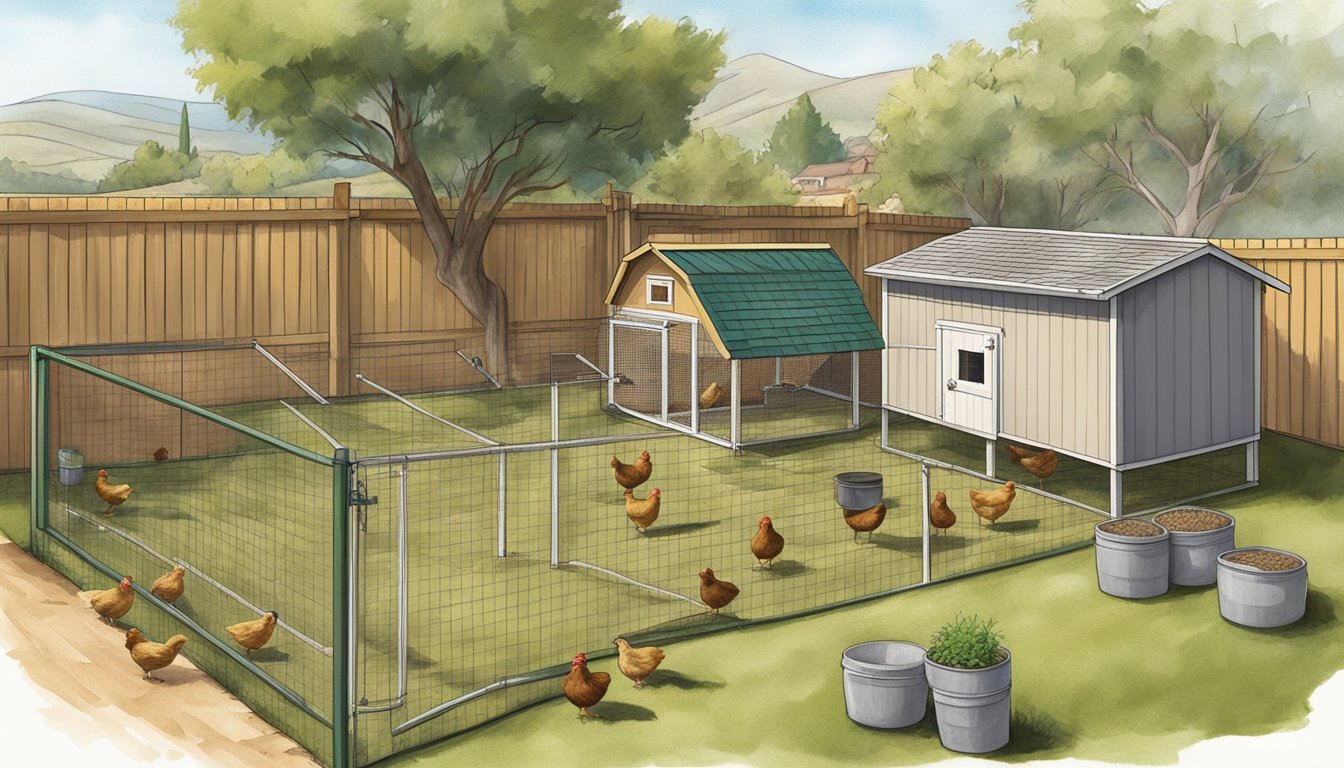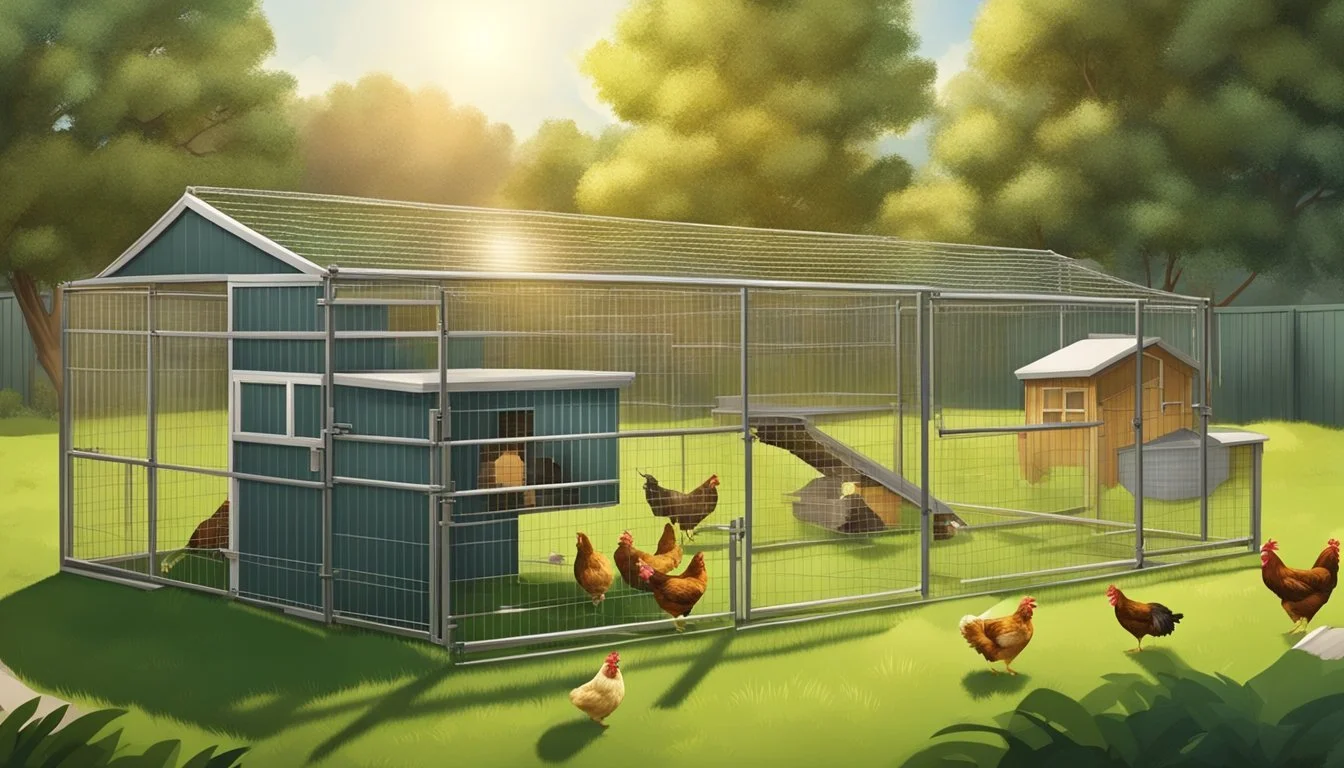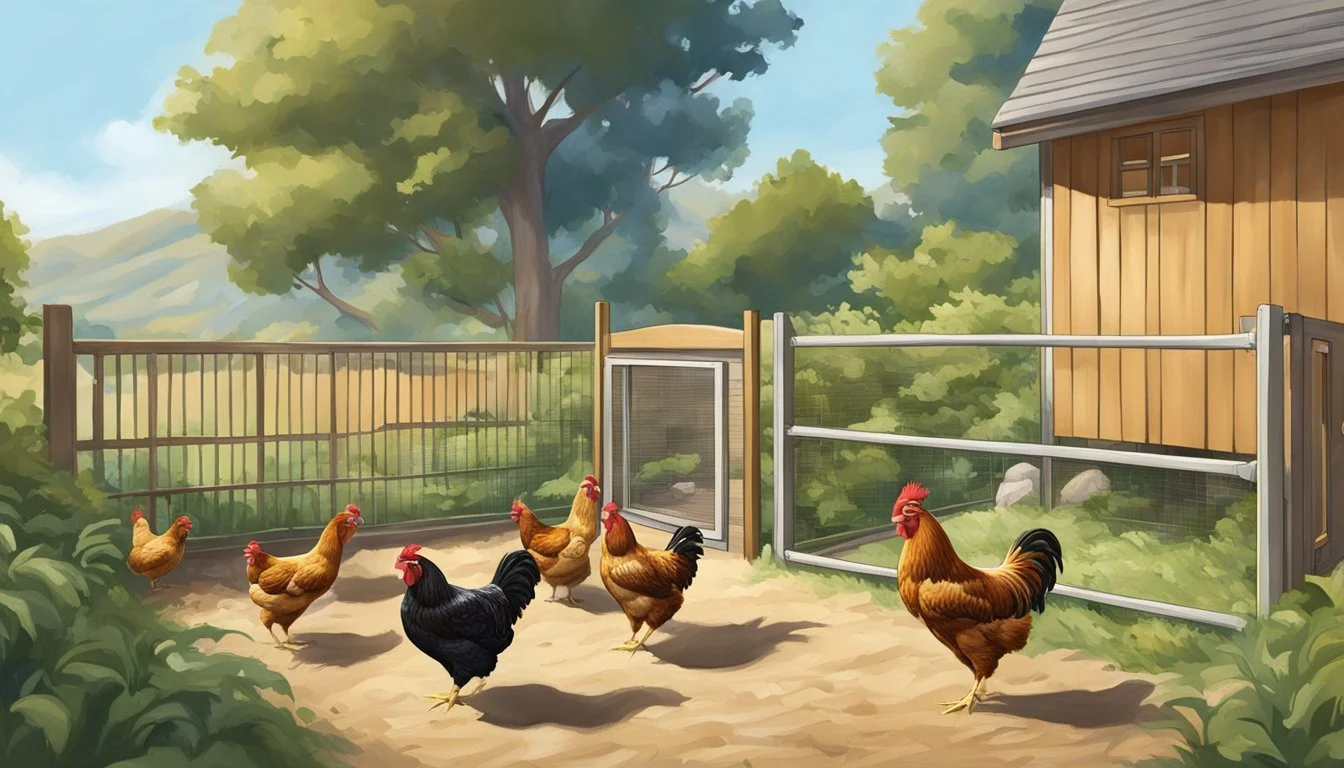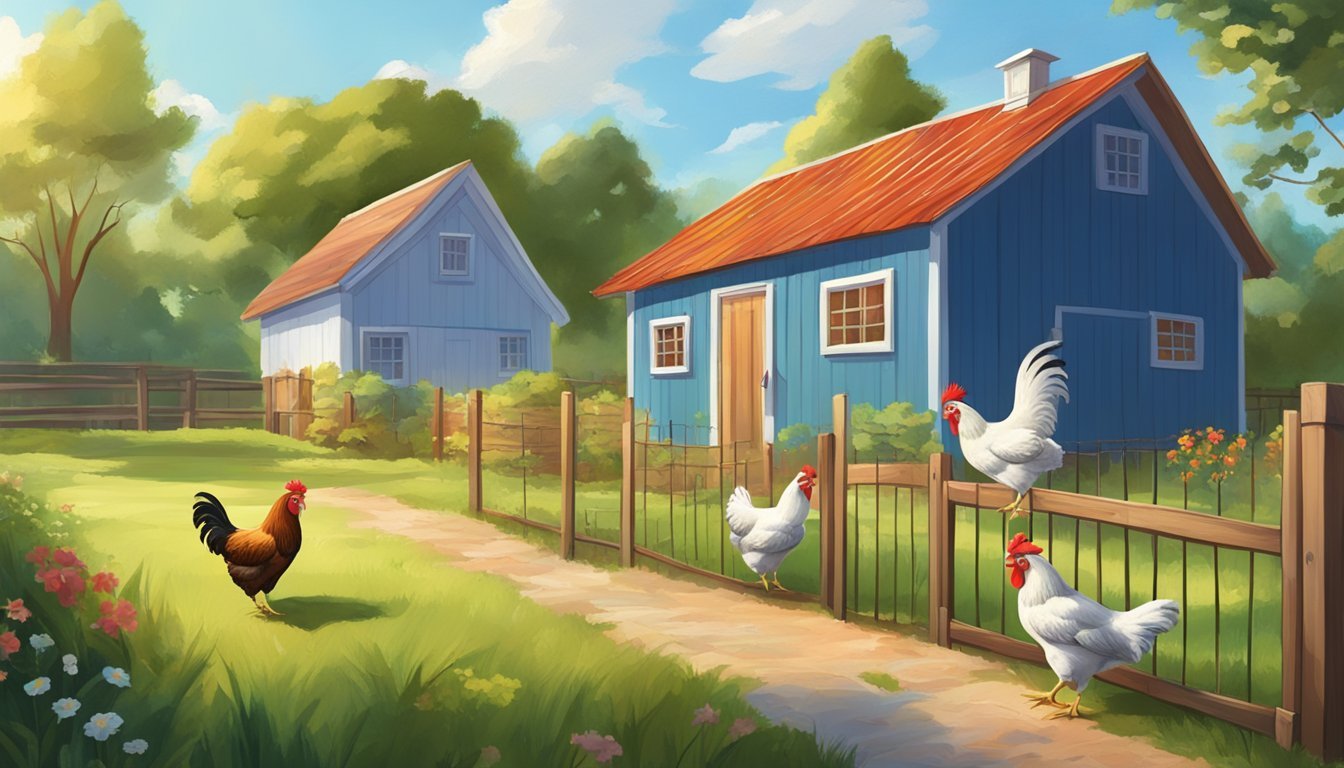Keeping Backyard Chickens in Simi Valley, CA
Essential Tips for Local Poultry Enthusiasts
Residents of Simi Valley, California, have embraced the trend of keeping backyard chickens, a movement that brings a slice of rural life into the urban setting. In the tranquil neighborhoods of this city, families and individuals are discovering the joys and benefits of raising their own chickens. Not only do these birds provide a source of fresh eggs, but they also contribute to sustainable living practices by providing natural pest control and producing valuable compost for gardens.
Simi Valley's local regulations accommodate the growing interest in urban poultry farming, with specific guidelines ensuring the welfare of both the animals and the community. The city is one of the few in Ventura County that allows residents to keep not only chickens but also roosters, albeit with certain restrictions. Interested citizens should familiarize themselves with the Animal Overlay Zones in the city, which dictate where farm animals can be kept and outline how to responsibly manage a backyard flock.
Furthermore, it is essential for prospective chicken keepers in Simi Valley to be aware of ordinances put in place to curtail the inhumane aspects associated with roosters, specifically in relation to cockfighting. This attention to detail reflects a commitment to animal welfare and community standards, maintaining a balance that respects the pastime of raising chickens while promoting a harmonious neighborhood environment.
Understanding Local Regulations
In Simi Valley, CA, it's essential for residents to be cognizant of specific local regulations related to backyard chickens to avoid potential fines and ensure community harmony.
Simi Valley Municipal Code
The Simi Valley Municipal Code lays out comprehensive guidelines concerning the keeping of backyard chickens. Any amendments to these codes can stem from decisions made by the City Council, which takes community input into account through public hearings and meetings.
Permit Requirements
For residents to legally keep chickens in their backyards, permit requirements may need to be met, contingent upon the number of chickens and the zoning of their property. It is vital to consult the local regulations or municipal authorities to ascertain if a permit is necessary.
Zoning and Property Restrictions
Zoning plays a critical role in determining if residents can keep backyard chickens. Residential areas are typically subject to stricter regulations, which are designed to minimize complaints from neighboring residences and maintain the suburban fabric of the community.
Number of Chickens Allowed
The specific number of chickens allowed in a backyard is governed by local laws. For instance, certain cities within Los Angeles County may allow a small number of hens without a permit, whereas others like Simi Valley might have distinct limitations or allowances.
Setback Requirements and Neighbors
Setback requirements ensure that chicken coops are a certain distance away from property lines to reduce nuisance and health concerns. Neighbors living in adjacent properties should not be unduly affected by the chickens, which is a consideration in defining these regulations. Complaints can lead to enforcement actions, thus maintaining the correct setback is crucial for compliance.
Residents should regularly review the Simi Valley city website or contact the Simi Valley Building & Safety Division to stay informed about current regulations and any changes that may affect their ability to keep backyard chickens.
Setting Up Your Chicken Coop
When establishing a chicken coop in Simi Valley, the focus should be on selecting an optimal location, ensuring safe and ample ventilation, maintaining cleanliness to prevent disease, and fortifying against predators to safeguard the chickens' health.
Choosing the Right Location
One must choose a location that allows for enough space on their property to avoid crowding and to adhere to local regulations that dictate the permissible distance from neighboring homes. The chosen site should provide sufficient sunlight, natural shade, and good drainage to promote the well-being of the chickens.
Designing a Safe and Ventilated Coop
A well-designed chicken coop is both predator-proof and well-ventilated. The coop's structure should prevent access from common predators like raccoons and hawks. It needs to have proper ventilation to ensure a steady airflow, thus averting the accumulation of ammonia and moisture that can lead to respiratory issues in chickens.
Ventilation: Install vents or windows that can be opened or closed depending on the weather.
Materials: Use predator-resistant materials such as hardware cloth instead of chicken wire for windows and outdoor runs.
Maintaining Cleanliness
Cleanliness is crucial for preventing disease and promoting overall chicken health. Coops and runs must be routinely cleaned to remove waste and leftover feed that can attract pests and lead to health issues.
Schedule: Establish a regular cleaning routine including a weekly removal of droppings and refreshing of bedding.
Bedding: Utilize materials like straw or pine shavings that can be easily replaced.
Protection from Predators
Effective measures must be in place to protect chickens from predators. This includes secure latches on all coop doors and elevating the coop off the ground. Enclosing outdoor runs with appropriate fencing and covering them with wire mesh can prevent attacks from above and around the coop.
Security: Ensure all potential entry points are secured, with attention to doors, windows, and any gaps or weaknesses in the coop's construction.
Inspection: Regularly inspect the coop for signs of attempted entry by predators and make necessary repairs immediately.
Chicken Care and Management
Responsible chicken care and management is essential for the wellbeing of backyard chickens in Simi Valley, CA. Adequate nutrition, health monitoring, understanding chicken behaviors, and proper egg handling contribute to a successful backyard flock.
Daily Nutrition and Feeding
Chickens require a balanced diet to maintain their health and egg production. A typical diet includes:
Grains and Seeds: A primary source of energy.
Pellets: Commercially available, formulated for nutritional balance.
Greens: Supplement with vegetables and weeds for vitamins.
Protein: Occasionally add mealworms or cooked eggs for protein.
Chickens also need constant access to clean water.
Health Monitoring and Prevention
Monitoring the health of chickens involves regular checks for signs of disease, such as:
Abnormal behavior or posture
Changes in eating habits
Respiratory issues
Preventative measures include:
Vaccinations: Protect against common diseases.
Parasite Control: Regular deworming and pest management.
Cleanliness: Maintaining clean coops to prevent disease.
Breeds and Behavior
Different breeds exhibit specific temperaments and egg-laying capabilities. For example:
Rhode Island Red: Hardy and commonly known for reliable egg-laying.
Silkie: Known for their calm demeanor but lay fewer eggs.
Choosing the right breed for your needs and space is important.
Handling Eggs and Nesting
Proper egg handling ensures safe consumption:
Collecting: Eggs should be collected daily to ensure freshness.
Cleaning: Gently clean eggs to remove debris before use or sale.
Chickens need comfortable nesting boxes:
Size: 12"x12" for hens to comfortably lay their eggs.
Location: Nesting boxes should be placed in a quiet, dark corner of the coop.
Proper nesting box maintenance is essential for the health and productivity of laying hens.
Community and Legal Considerations
In Simi Valley, CA, keeping backyard chickens involves navigating local ordinances and maintaining community relations. The section below outlines essential aspects of community and legal considerations for residents.
Dealing with Complaints and Common Sense
Residents must approach keeping chickens with common sense and courtesy. This includes managing noise, odor, and property upkeep to prevent complaints. They should ensure that chickens do not become a nuisance to neighbors by providing adequate space, cleanliness, and noise control. Proactive communication with neighbors can preempt issues and foster understanding.
Understanding Animal Overlays
Simi Valley’s municipal codes include animal overlay zones that specify where keeping chickens is permissible. Homeowners should reference these overlays to verify if their property falls within areas that allow backyard chickens. It's a good practice to review the city's zoning maps or contact the local government for clarification before investing in a backyard coop.
Engaging with City Council and Planning Commission
When ordinances do not favor backyard chickens, residents can engage with the City Council and Planning Commission. Participating in public meetings and submitting proposals for ordinance amendments is a legal avenue to address restrictions. In some instances, like within a small rural pocket of Simi Valley, residents have successfully maintained the right to keep livestock through active civic involvement.
Additional Resources and Tips
For residents in Simi Valley, CA interested in raising backyard chickens, a wealth of resources is readily available. Engaging with educational materials and leveraging online communities can provide both novices and seasoned chicken keepers with valuable information and support.
Educational Materials and Local Workshops
Local workshops offer practical, hands-on training for individuals interested in keeping chickens. These workshops cover a range of topics, from coop design to chicken health. Ventura County Public Works Agency, among others, may host such events, providing community members with the service of education and the tools to start their own flock responsibly.
Online Forums and Social Media
Online communities are a rich source of tips and information for backyard chicken enthusiasts. Websites like BackYard Chickens provide platforms where individuals can connect and share experiences. Moreover, local Facebook groups, such as the one found by searching "VentuckyChicken," can offer specific advice pertinent to the Simi Valley area, creating a network for support and shared knowledge.
Beyond the Backyard
Raising backyard chickens in Simi Valley extends beyond the confines of personal property lines, inviting enthusiasts into a broader community that includes urban livestock and poultry exhibitions. These ventures offer a practical and engaging way to share experiences, knowledge, and the fruits of one's labor.
Urban Livestock and Alternative Poultry
In the urban settings of Simi Valley, individuals often explore alternatives to traditional livestock due to space and regulatory constraints. Alternative poultry, such as quails (What wine goes well with quail?) or ducks, could be raised alongside chickens, offering variety in both the experience and the products, like eggs or meat, they provide. These settings aim to combine the rural charm of livestock rearing with the realities of urban life, creating a viable blend of the two.
Main points:
Exploring non-traditional livestock fits urban spaces
Diversifying urban poultry can enrich the raising experience
Participating in Shows and Local Events
Community events and exhibitions offer chicken owners in Simi Valley the opportunity to showcase their poultry rearing accomplishments. Participation in local shows or 4-H events allows owners to celebrate their commitment, gain recognition for their efforts in raising backyard chickens, and engage with fellow enthusiasts.
Key benefits:
Recognition for excellence in chicken raising
Community engagement with other poultry enthusiasts
These initiatives promote shared learning and celebrate the intersection of backyard farming with the broader community, offering multiple platforms for visibility and interaction.
Local Chicken Regulations by City
Each city in Southern California has distinct regulations governing the keeping of backyard chickens. Compliance with local laws is crucial for residents interested in raising poultry at home.
Los Angeles County
Los Angeles: No roosters are allowed; number of hens is limited depending on lot size.
Pasadena: Specific coop requirements are in place; distance from neighbors must be considered.
Gardena: Residents can keep chickens with certain limitations regarding coop location and care.
Baldwin Park: Allows up to three chickens in a restricted zone with no permit required.
Bellflower: Up to 25 chickens allowed; no roosters or permit required.
San Diego County
San Diego: The number of chickens allowed varies by the distance of the coop from neighboring houses.
Carlsbad: Chickens are permitted with stipulations on coop construction and maintenance.
La Mesa: Regulations include coop specifications and limits based on property size.
Oceanside: Allows the keeping of chickens with mandatory adherence to coop placement rules.
Orange County
Anaheim: Backyard chickens are allowed with conditions on coop specifications and location.
Brea: Chickens are permitted; however, there are limitations on the number based on land area.
Orange: Requires specific coop criteria and management practices for keeping chickens.
Garden Grove: Residents are allowed to keep a limited number of chickens sans roosters.
Riverside County
Riverside: Allows chickens with restrictions on the number depending on the residential zone.
Temecula: Chickens can be kept with adherence to regulations regarding coop location and size.
Moreno Valley: Permits the keeping of chickens under certain conditions relating to housing and care.
Each city's municipal code provides detailed language on the do's and don'ts of backyard chicken keeping, ensuring the welfare of the animals and the community. It is essential for potential chicken owners to familiarize themselves with these ordinances to ensure they are following all legal requirements.
Conclusion
In Simi Valley, California, the practice of keeping backyard chickens has been under scrutiny due to changing zoning laws and urban planning. Local residents have expressed a strong desire to maintain their right to keep livestock, including chickens, in their neighborhoods. The city's interest in higher-density housing development has raised concerns about the future of this practice.
Advantages of Backyard Chickens in Simi Valley:
They provide a source of fresh eggs.
Chickens can contribute to garden fertilization.
They help in reducing food waste by consuming kitchen scraps.
The presence of chickens contributes to pest control by eating insects and weeds.
Challenges and Considerations:
Urban areas may face issues such as noise and odor.
Responsible ownership is crucial to prevent nuisances.
It is important to adhere to any local regulations regarding the keeping of backyard chickens.
Those in support of backyard chickens highlight the educational value for children in understanding food sources and responsible animal care. In conclusion, while there are clear benefits to raising chickens within Simi Valley, residents must navigate the local laws and community standards to ensure they contribute positively to their urban environment.

